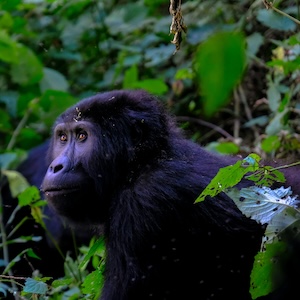
Impacts of Climate Change on Spatiotemporal Relationships Between Human Disease, Gorilla Health, Livestock Health, Water Resources, and Biodiversity in Uganda
Research Location:
Implemented: Uganda
Conservation Partner:
Conservation Through Public Health
Faculty Mentor
Dr. Scott Ickes and Dr. Sapana Lohani
Project Description
W&M and Ugandan students will work with Conservation through Public Health to explore the spatial and temporal relationships between human disease, gorilla health, livestock health, water resources, and biodiversity needed to prevent the transmission of disease.
It is well documented that climate change related impacts on health and disease incidence are increasing, particularly with regard to the incidence of zoonotic diseases. Conservation through Public Health has been conducting a comparative disease analysis of zoonotic disease prevalence amongst gorillas, livestock and people living in proximity to a critical Mountain Gorilla habitat in Bwindi Impenetrable National Park (BINP) for almost 20 years.
Using recorded fluctuations in disease incidence and transmission, W&M and Ugandan students will use GIS to map disease incidence in gorillas, livestock and people. The students will explore how water resources and climate change may influence these disease patterns. This information will inform CTPH's management of cross-species disease transmission, which is critical to survival of mountain gorillas and the health of local communities. This project will also assess the extent to which community members around Bwindi understand the linkages between climate change and deteriorating health outcomes and how they adapt to climate change's impacts. This research will inform programming for human behavior change communication around climate change and health. behavioral change communication around climate change and health.
Number of Students
2Prerequisites and Required Skills
Student 1 Pre-req: GIS 201 or equivalent and introductory statistics
Student 2 Pre-req: Coursework in public health or environmental health and introductory statistics
Travel Required
Two students will travel together to remote, Buhoma Uganda for several weeks throughout the summer and will stay at the Conservation Through Public Health Conservation Camp with Ugandan student research colleagues and the CTPH team. Students will stay in tents and will eat meals at a communal field station with limited access to running water, electricity, and wifi. Students should be prepared to hike in variable conditions collecting biodiversity, human health, and livestock data. Students should be prepared to travel and work in a multicultural community and research team, with a commitment to flexibility, self-awareness, and new experiences. Students should be mature, self motivated, and committed to safety and health when traveling.Project ID - Format
25-002-25 - CRP Year














